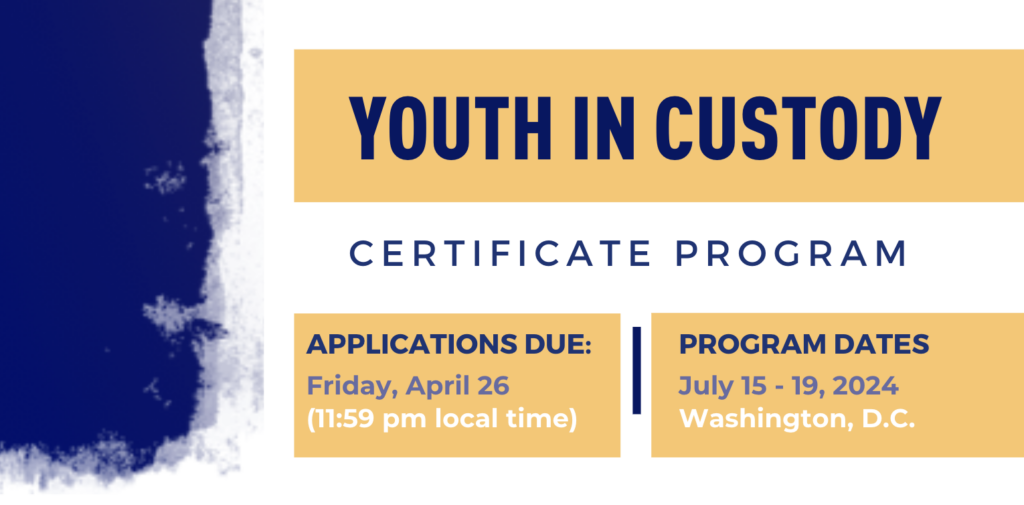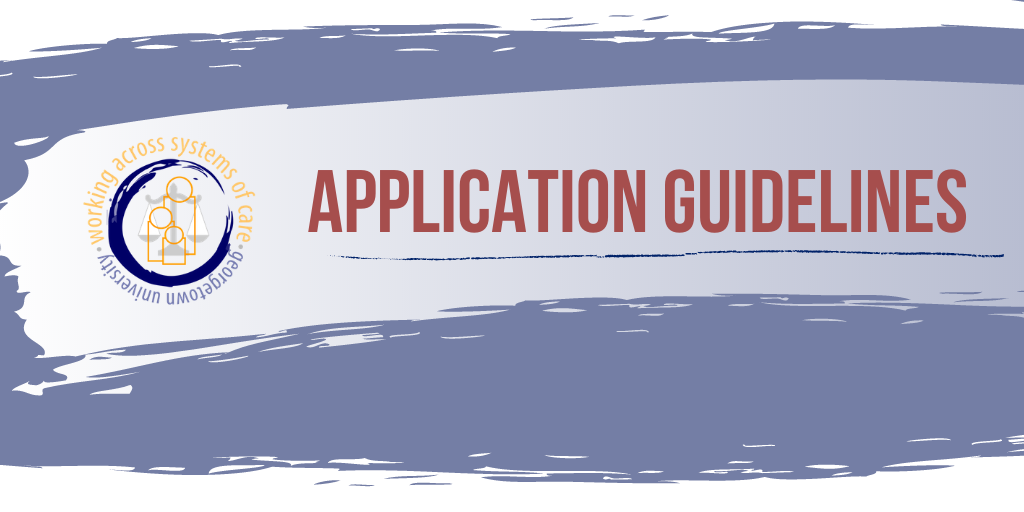Youth in Custody

The Youth in Custody Certificate Program is designed to help leaders implement or accelerate systemic change to improve outcomes for youth in custodial settings.
The training provides an interactive and dynamic learning environment with instruction from national experts on cutting edge ideas, policies and practices from across the country. Specifically, the program focuses on the serious, high-risk youth population and integrates best practices around culture change and leadership, evidence-based tools to assess youth’s risks and develop individualized case plans, supporting positive relationships between and among staff and youth, shaping facility’s physical environment, delivering effective programming and treatment, as well as strength-based approaches and re-entry support.
Curriculum
The curriculum will focus heavily on the change process that is needed to move forward reforms for youth in the custody of the juvenile justice system after case disposition. Case studies and other interactive learning techniques help participants apply the learning to situations they are likely to encounter. A common theme throughout the program is that for any one piece of the youth legal system to be as effective as possible, all components of the system must be working together. We set out a vision for participants that details what an ideal system looks like so they have a model to strive towards and can place their efforts within a larger context.

Instructors
Instructors for the 2024 program are to be determined. Potential instructors include:
- Monique Khumalo, Ph.D., Principal Owner, Youth Trauma and Justice Solutions
- Ashaki McNeil, Deputy Director for Reentry, Education, and Interventions, Virginia Department of Juvenile Justice
- Peter Leone, Ph.D., Professor Emeritus, University of Maryland, Department of Counseling, Higher Education, and Special Education (CHSE)
- Brett Peterson, J.D., Director, Utah Division of Juvenile Justice and Youth Services
- Michael Umpierre, J.D., Director, Center for Juvenile Justice Reform
The Certificate Program in Action!
If you’d like to learn about how the Youth in Custody Certificate Program has been implemented in practice, we recently hosted a webinar where we were joined by representatives from Utah Juvenile Justice and Youth Services and the Bexar County, Texas Juvenile Probation Department to discuss practical strategies for partnering with youth, families, and community organizations in residential settings. This conversation highlights a variety of approaches, such as youth councils, Child and Family Team Meetings, and more, used by practitioners in Utah and Bexar County to engage lived experts and improve their system experiences.
Application Guidelines
While there are no minimum education or experience requirements to apply, a preference will be given to those in a professional position to move reform efforts forward upon completion of the program. Participants can be individuals working on youth in custody issues at the local, state, or national level.
Applicants are strongly encouraged to apply as a team of up to ten individuals from the same jurisdiction. While each application will be reviewed on an individual basis, the value of this team approach will be considered in our review of applicants. CJJR particularly encourages teams comprised of both public and private agency leaders.
Teams should be comprised of applicants with demonstrated readiness for implementing reforms, especially efforts that engage leaders in other systems, and their agency’s relationship with other child-serving agencies. Team members can be senior level professionals in the juvenile justice, child welfare, mental health, substance abuse, education, and other related systems of care. We strongly recommend including the following team members:
- Agency-level leaders (e.g., agency director, representative of the juvenile justice agency that operates or contracts with facilities in the jurisdiction, director responsible for facility operation)
- Facility-level staff (e.g., superintendent, unit supervisor, line-level custody staff)
- Programming staff (e.g., behavioral health leader, educator)
- Community partners (e.g., representative from the community who provides support to youth in custody and/or upon re-entry)
- A young person or family representative who has personal experience with the youth justice system
This program is NOT accepting applications from students who do not also hold a professional role in a child serving organization.
Application Materials
Applications are now open! Applications will be accepted until 11:59 p.m. on Friday, April 26, 2024 (in the applicant’s local time zone).
While each team member is required to submit an application, only ONE set of essay responses is required per team. If you have been designated to submit essay responses on behalf of your team, you will be prompted to upload them as a Word document.
In order to apply to the Certificate Program, you will be required to create a Submittable account. Once you have created an account, you will be asked to provide your Contact Information, Demographic Information, Professional Biography, and Personal Statement. Additionally, if you have been designated to submit essay responses on behalf of your team, you will be prompted to upload your essay responses via Word document (i.e., each team is asked to submit just oneset of essay responses).
Once you have submitted your application, you should receive an email confirmation within 24 hours. If you do not, please contact us at Amber.Farn@georgetown.edu.


Testimonials
Hear from just a few of the many communities that have participated in the Youth In Custody Certificate Program.
More Information

As part of the Certificate Program, participants are required to develop and implement a Capstone Project during the twelve-month period following the completion of their Certificate Program session.

The primary goal of all of our Certificate Programs is not simply knowledge, but effective implementation in a local reform effort. We study “what works” and collaborate with leaders to bridge the gap between theory and practice.
